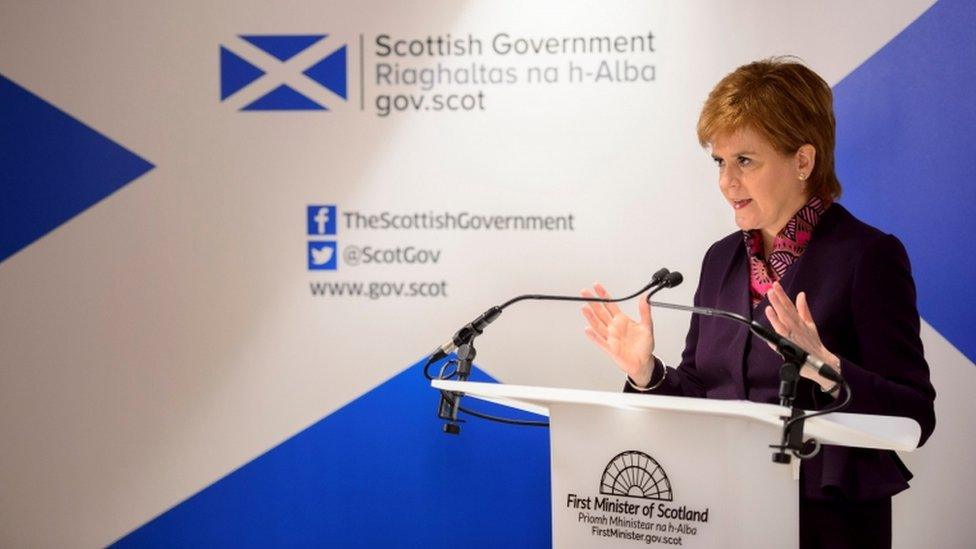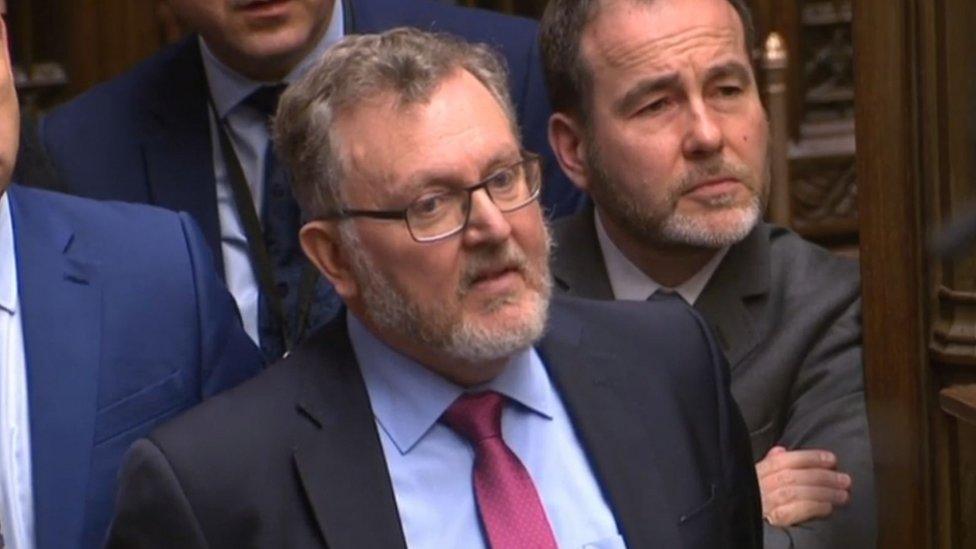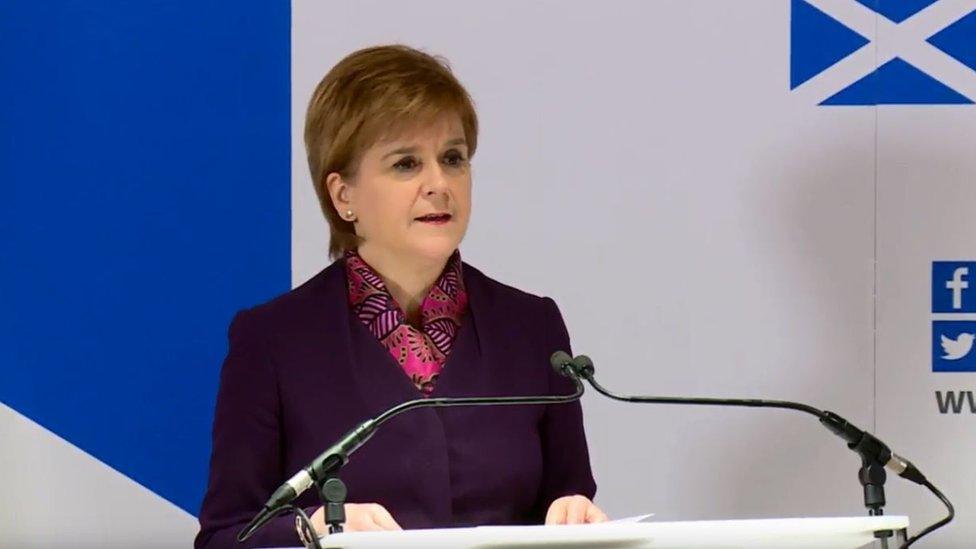Indyref2 talk crowded out by Brexit
- Published

Nicola Sturgeon waved away any talk of indyref2 during her Brexit press conference
There is a sentence frequently heard in the House of Commons. It is along the lines of "I refer my honourable friend to the reply I gave some moments ago."
It is a useful shorthand, avoiding unnecessary repetition. Very occasionally, if delivered with particular venom or irony, it can also mean: "I've already answered that, you bozo, weren't you listening?"
But, normally, it is simply a means of keeping things succinct. Because, of course, the Commons never descends into unwarranted and protracted verbiage. The very thought.
Today, Nicola Sturgeon and Mike Russell, the minister for mitigating Brexit, resorted to a Scottish version of that Commons mantra.
When asked about independence or indyref2, Ms Sturgeon said she had dealt with that question in a BBC interview with Andrew Marr yesterday - and, indeed, last week on Good Morning Scotland and, further, when quizzed by me for the telly.
She had, she plainly implied, nothing to add. Mr Russell took a decidedly similar line when pestered by the wicked media at the event and later. One might almost think they had planned their response.
By contrast, David Mundell, the Scottish secretary, seemed notably keen to talk about independence to the exclusion of all else. This can, of course, be readily explained.
Brexit options
Ms Sturgeon and Mr Russell continue to yearn for independence. But they know that the uncertainty, the disquiet, caused by Brexit is crowding out all other constitutional (and, indeed, economic) matters at the moment.
Folk are troubled. Businesses are concerned. They want answers. The first minister reckons it is her duty to assist, to join the discourse.
And so today's paper - drawn up by civil servant economists - canvasses options with regard to Brexit: single market membership, a Canada-style trade deal or no deal resulting in World Trade Organisation (WTO) rules.
Each of these, according to the paper, would result in a diminution of the scope of the Scottish economy. The WTO version - the so-called hard Brexit - would be measurably the worst.

David Mundell and the Scottish Conservatives have charged Ms Sturgeon with scaremongering
In response, Mr Mundell and the Scottish Conservatives more generally characterised the approach taken by the SG as scaremongering.
However, it was notable that they also laid stress upon the threat allegedly posed by independence. Scotland, they say, would suffer far worse harm from leaving the UK than from leaving the EU.
This is entirely understandable, from their perspective, particularly in a longer-term context. Still, it is not in itself a sufficient response to today's paper.
A further referendum on independence remains hypothetical for now, as Ruth Davidson repeatedly reminded me in an interview on Friday. It is not presently on the table from the FM and could, presumably, be blocked if the UK government refused to transfer the relevant powers.
Secondly, the assessment published today deals with the immediate - and decidedly real - prospect of Brexit. Not with any hypothetical indyref2. But with the immanent and imminent consequences of the Brexit vote.
Therefore, castigating an issue which was not raised by the FM is scarcely enough. To be fair, however, Mr Mundell went further. He said the figures generated by the SG exercise failed to take account of the determination of the UK government to secure a bespoke deal. Different, presumably, from Norway and Canada.
Last resort?
Which still leaves valid questions arising from today's exercise. Is it true that the best/least bad option is membership of the single market? If it is, can that/should that be secured through cross-party discussions and votes in the Westminster parliament?
Is there, as Nicola Sturgeon asserts, a natural majority for such a position in UK politics, one which transcends party lines? One which could be mustered, with SG help?
Or is she indeed scaremongering, underplaying the capacity of the UK team to reach a good deal?
One further thing. As I forecast last week, the document lays considerable stress on the need for EU migration to Scotland in order to provide the economic and tax base for funding public services. That, again, is an issue which arises now - not solely during any putative indyref2 campaign.
However, while the issue of independence may not be a sufficient rebuttal to today's document, it remains highly germane in Scottish politics.
Ms Sturgeon may have referred us to earlier answers today. But she has, of course, not forgotten the aim of independence. Not for a second.
Which provides another context to today's contribution to the existing discourse over how Britain leaves the EU. Eventually, not today but eventually, the latest paper may be cited as evidence that the Scottish government pursued every avenue before resorting to the option of indyref2.
- Published15 January 2018
